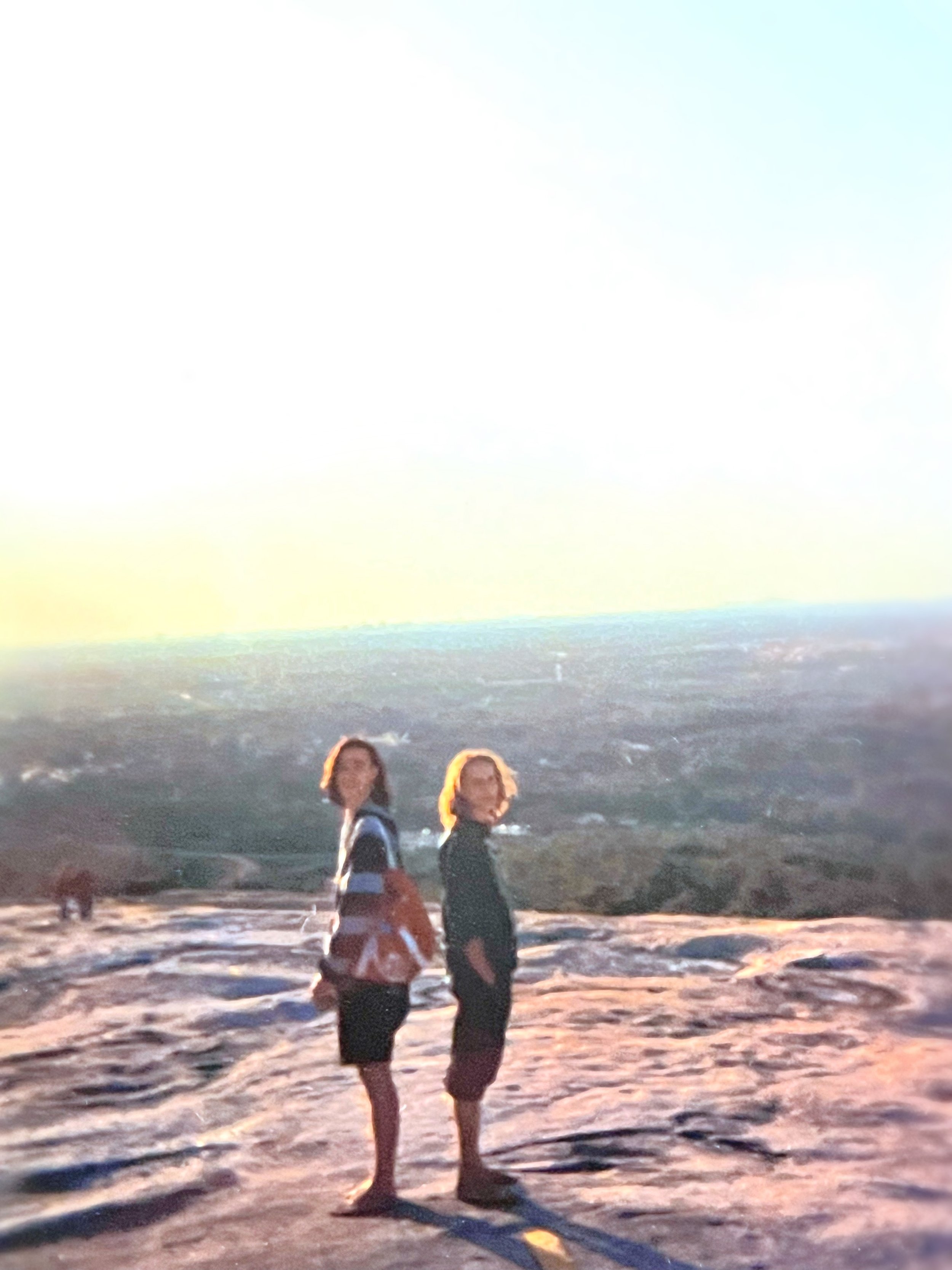Blessings to you!
It's Nathan reaching out again with another strange but normal thing about grief that doesn’t get a lot of attention…
Our brain will actively fight the truth of our loss.
Some of this shows up in what many relate to as “the initial shock”.
Some of this shows up in what we’re taught to call “the denial stage”.
Some of this shows up in long lost memories that come flooding back.
Some of it shows up when we “still just can’t believe” they’re gone.
Some of it shows up as that relentless yearning for the return we “know” isn’t coming.
Some of it in those moments we’re somehow “reminded” of the loss and we gasp and weep anew.
When we are especially close with someone, and particularly when we have been close over a long period of time – our brain maps our relationship to them. It maps our proximity in space, in time, and in emotional closeness.
My heart-brother, Edward and me at Stone Mountain around 1991 and a great metaphor for where he was mapped in my brain at all times...)
When we are together at formative times, then how our brain maps this relationship also becomes linked to our own identity – how we see our own “me” becomes informed by this particular “we”. And like everything else (in our entire life) that the brain maps, our brain uses the map of this relationship to make predictions about how the relationship will perform.
And just as it does with the map of the distance from the bathroom to the bedroom, the brain uses the map of a relationship to make predictions for what we can expect in interacting with the relationship – moment to moment, day to day, and year to year. This is how we get from the bathroom to the bedroom (and most places we regularly visit) without thinking about it, without working that hard, usually without even noticing it – because our ability to make reliable maps and then predict our ways through them is that excellent.
In fact, we’re such good predictors that we usually only notice our predictions when we make errors.
We don’t perceive all the correct predictions that we’re making because they’re all just going so smoothly. Only when we bang into the doorjamb on the way out of the bathroom do we have any reason to tune into the “prediction error” that has just occurred. Often, unless we catch and correct it fast enough, and as in the case of the doorjamb, the prediction error comes with a shock, maybe some pain, and then a reorientation.
This is what’s happening in the grieving process. Over and over, until it finally learns the terrible, awful truth – the brain is making, experiencing, and correcting prediction errors. Catching ourselves realizing that our map of this relationship is out of date…
The truth – that the person we’ve been in relationship with is permanently gone from our experience – doesn’t match our map of the relationship. And interrupts our normal predictions of where they are in space, time, and closeness to us. It doesn’t add up. We sense a vast and immovable prediction error. We cannot correct it fast enough not to notice.
And in that searing chasm of interstitial space we meet our grieving.
It is part terra incognita, a land we have never seen, and where “there be monsters”.
It is part the painfully arduous work of learning life’s most terrible lesson.
It is part purgatory, where we wait for grace.
It is part a healing ritual waiting for a village to breathe it into blaze.
While our brain wrestles with the truth, we’re left in limbo. We feel the shock. We can’t believe they’re gone. We keep thinking it might be a mistake. We keep hoping we’ll wake up. We keep looking for them. We keep reaching for them. We keep expecting (before we catch our self) that they’ll respond, or write back, or reach out.
This isn’t because we’re crazy, not letting go, or in denial.
This is simply because the brain has been able to rely on the map of this relationship for however long we’ve been in relationship. Almost all of those times, it has been relatively correct about where our person was, how far away physically, and how close in our hearts. We have lived by this map. And now it’s just plain wrong.
And our brain keeps grabbing the map back from our hands to point at it and say, “No, they’re right here. I just know it!”.
And until our brain has a chance to update the map, we feel the terrible prediction error lingering uncorrectable in our understanding of this relationship, in our understanding of our self, and in our understanding of the maps of all our relationships.
When my brother passed suddenly, I didn’t have the “benefit” of knowing in advance. (So my brain struggled with “How could this be?”.)
When they found him, I didn’t get to be there. (So my brain argued with whether or not it was really him.)
When they took his body to the mortuary, I did’t get to see his body. (So my brain refused to confirm the body was no longer animated with his spirit.)
When they cremated him, I didn’t get to see his body go back into the Earth. (So my brain keeps a ray of hope that it’s all been some terrible mistake.)
When we celebrated his life, we didn’t have a village or traditions or rituals to guide us. (So my brain has had to find other ways to compensate for humanity’s ancient technology of integrating my bereavement.)
We have forgotten how to hold our grieving together. And as a result, many of us are having to remake our maps alone, in the dark, and with no tools. And so the internal battle in our brain is more painful, more difficult to manage, and more likely to leave us thinking we’re losing our mind along with our loved one.
I haven’t been a grief specialist. I’ve been an emotional processing and healing specialist. And for me it has been appalling and awful, but also fascinating to watch the tools I have support me in my grieving process.
And if my partner (Natalie, who has been so generously supportive) and I didn’t have the know-how that we do – I don’t even want to think about where I’d be with my loss…
If you are grieving, please be gentle with yourself. Please know that you are with so many others grieving too. Please see yourself with kindness and compassion as you (and your brain) work through this excruciating education. And please access facilitation in whatever ways are right for you – this is not the time to go it alone.
Also, here's a link to a podcast I was on last week if you want to hear me talk about grief some more:
Sending you big love. Keep going!
Be well,
Nathan (and Natalie) 💛
~
If I can be of any support to you at all, I'm here for it.
If you're grieving and you want help, I'd like to give you a Feel Better Already Strategy Session.



